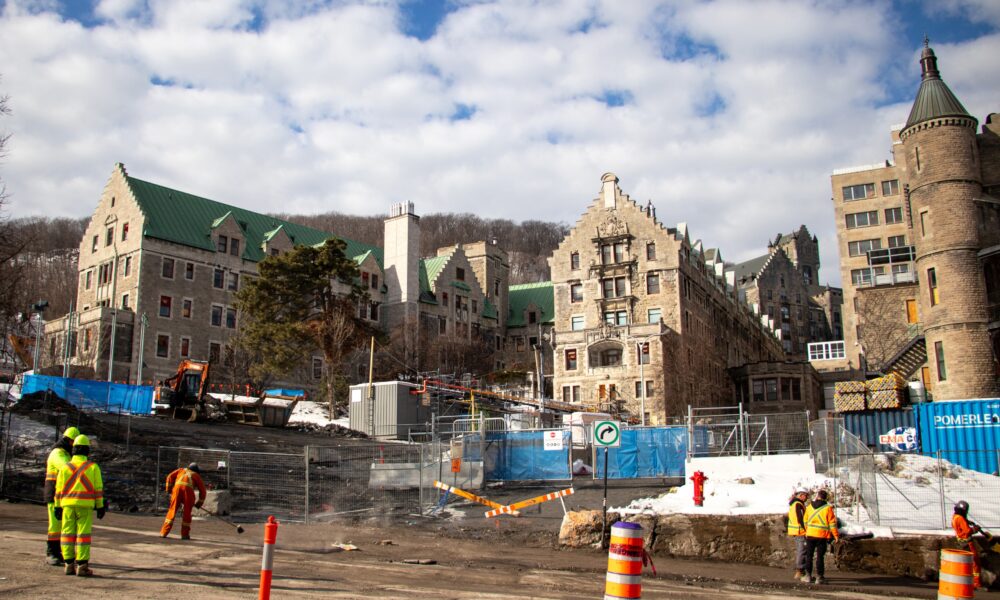On Feb. 9, McGill held a virtual roundtable discussion on its New Vic Project, hosted by Provost and Executive Vice President (Academic) Christopher Manfredi. The New Vic Project is the subject of an ongoing investigation prompted by a lawsuit that the Kanien’kehá:ka Kahnistensera (Mohawk Mothers) filed against McGill, the Société québécoise des infrastructures (SQI), the Royal Victoria Hospital (RVH), the City of Montreal, and the Attorney General of Canada over concerns about potential unmarked Indigenous graves on the project site. Members of Settler Solidarity—a group formed to support the Mohawk Mothers—held a simultaneous virtual screening of the university’s roundtable, with the Mothers present. After McGill’s event, the Mothers engaged in a discussion with the students and various stakeholders present at the Settler Solidarity screening, pointing out that McGill had cherrypicked the questions they answered.
McGill Director of Institutional Communications Michel Proulx moderated McGill’s presentation, which began with a brief land acknowledgment followed by an introduction to the speakers of the event: President Deep Saini; Christopher Buddle, Associate Provost, Teaching and Academic Planning and Academic Lead for the New Vic Project; Pierre Major, Executive Director of the New Vic Project; Bruce Lennox, Dean of the Faculty of Science and New Vic Academic Design Lead; and Viviane Yargeau, Dean of the Faculty of Engineering.
Saini welcomed the over 200 audience members, after which Major presented the project’s footprint and design. He shared that the building is both a historical meeting site for Indigenous peoples and an opportunity to tackle the space deficit problem at McGill. Major touched on the design of the project, saying that it is in line with McGill’s commitment to reconciliation with Indigenous communities. According to Major, there have been over 50 meetings with Indigenous stakeholders, several co-creation workshops, and roundtable sessions with Indigenous elders. These meetings resulted in several ideas for physical representations of Indigeneity in and around the buildings, such as highlighting the idea of basket-weaving through the ceilings and incorporating Indigenous-designed sculptures. He then spoke about the concerns over the university’s handling of the ongoing investigation into the former Royal Victoria Hospital site.
“We have endeavoured to keep our community apprised of our methods and outcomes of this work and have maintained a comprehensive FAQs page on the New Vic project website and have provided regular updates via email,” Major said.
Major asserted that the court was right to hear McGill’s appeal of Justice Gregory Moore’s Nov. 20 decision to reinstate the court-appointed archaeological panel that oversaw the investigation. He believes the panel’s mandate was carried out and, thus, the panel rightfully dissolved. McGill and SQI both appealed the Nov. decision because, in their view, the judgement had contained legal and palpable errors. He concluded by urging people to read their FAQs page for more information.
As the presentation concluded, the meeting entered a question and answer period, during which the speakers answered questions that audience members had submitted in advance. The questions pertained to pedestrian traffic, specific sustainability initiatives, consultations with Indigenous faculty, and accessibility.
After the discussion wrapped up, the Mothers shared their thoughts about the roundtable in the virtual meeting they had screened the roundtable. Mohawk Mother Kwetiio expressed that she found that there was no care given to the possibility of there being graves on the site. Additionally, Kwetiio pointed out that not all submitted questions had been answered, and that the administration had cherry-picked the questions they answered.
“They’re just talking about [the] Quebec restoration of that building. That’s what’s important to them,” Kwetiio said. “So nothing there was talked about. So they’re not taking it seriously. There’s total denialism going on.”
Kwetiio additionally stressed the importance of the Mothers having an open forum discussion with students in order to present them with the facts of the case. Mohawk Mother Kahentinetha echoed this sentiment and pointed to the challenge students must take on to educate themselves on the realities of the case.
“We’re in court […] but we would like you to stand with us. Stand with us by knowing the history, knowing what’s going on right now [….] And what is your reaction to what you’re finding out?,” Kahentientha said. “It is up to you to start looking around and finding out the truth.”








